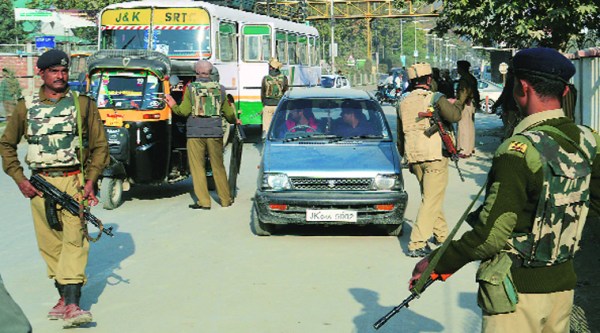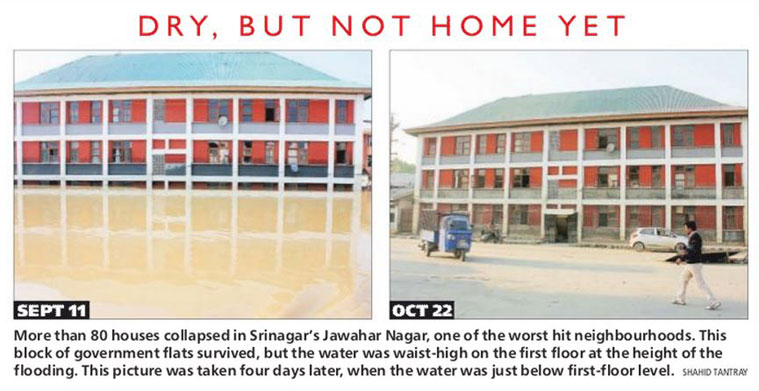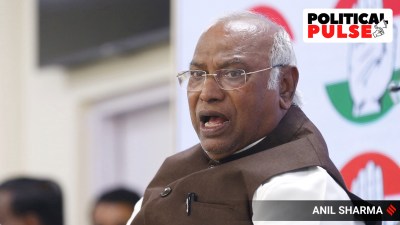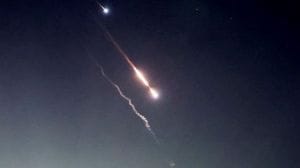- India
- International
If PM Modi listens, he may find a weary Srinagar asking for a hearing
FLOOD WRIT LARGE: Could be moment for Naya Kashmir, Naya Modi: Mehbooba.
 Security personnel check vehicles in Srinagar on Wednesday ahead of PM Narendra Modi’s visit. Source: Shahid Tantray
Security personnel check vehicles in Srinagar on Wednesday ahead of PM Narendra Modi’s visit. Source: Shahid Tantray
Separatist leader Syed Ali Shah Geelani has called for a shutdown in Srinagar tomorrow on the day of Prime Minister Narendra Modi’s visit but he need not have bothered. This is a mostly shuttered city still struggling to get back on its feet after the flood nearly a month-and-a-half ago. Most shops in the affected uptown area are yet to reopen, streets are lined with skeletons of buildings whose interiors have spilled out and lie in abandoned piles of wood, steel and tapestry. The waters of the Jhelum have receded but the flood continues to be writ large in Srinagar.
That the PM is arriving to share his Diwali may mean little to those whose Eid was perhaps the most despondent they have ever known. Many say it was more desolate than it ever was even in the 1990s when the Valley was convulsed by daily violence.
This Eid, the city’s bakeries — traditionally the most visible hub of festivities with their brisk business of biscuits and cakes on the day — remained closed. Even those who could afford to spend, did not, as a gesture of sympathy with the plight of less fortunate fellow citizens.
Kashmiris have not just made gestures since the waters rose, they have reached out to each other in ways large and small. Stories abound of brave volunteers with boats who saved the lives of complete strangers. In the days when rescue was the pressing imperative, help came from villages bordering Srinagar and from far-off areas as well.
Volunteers streamed in from the old city areas which mostly escaped the fury of the floods. Now that rescue has given way to relief and rehabilitation, private initiatives are still the most visible — the state government is still said to be missing.

In this landscape of desolation and loss, and of a people forced to face an unprecedented disaster by falling back on their own resources, PDP leader Mehbooba Mufti insists that the Prime Minister’s visit matters and that he has an important opportunity. “His is a much-needed visit. I told him when I met him in Delhi that the people need reassurance. Any package will take time to bear fruit on the ground but if the PM comes here and meets delegations of those whose businesses and livelihoods have been destroyed, it would mean a lot, send out a message.”
The PDP, she says, has asked that the PM should also set up a committee of experts to assess the damage and to monitor the delivery of any Central aid package “because the state government has totally lost credibility” and because the people are fed up with the “bandar baant” or allegedly unfair distribution of aid and relief by the National Conference-Congress government.
“A healing touch is needed”, she says. Despite the cynicism and alienation now compounded by terrible loss, this could be the moment for a “Naya Kashmir” to emerge, and, she says, even a “naya Modi”.
The PDP leader’s talk of new beginnings is an unsubtle attempt to show up a deeply unpopular incumbent government whose remaining credibility seems to have been washed away by the floods. With elections round the corner — the PDP plans to start mobilising its workers on Friday — Mehbooba’s loud endorsement of Modi’s visit could also reflect the realisation that should a PDP government come to power, it will need to seek help from the Centre to tide over the massive task of rehabilitation and reconstruction.
Yet, Mehbooba Mufti may also be echoing a deeper sentiment in Srinagar today.
In this city with an acute sense of its own separateness and distance from the rest of the country, a people who have exhausted their own reserves of resourcefulness and resilience are now looking for “external” succor.
In Mahjoor Nagar, a lower middle class area of uptown Srinagar, Noor Mohammed, a driver by profession, insists that there is only one way out: “Modi must announce that he is setting up his own committee to oversee the implementation of Central aid. He must not leave it to the state government”.
In Mahjoor Nagar, too, the government did not reach the flood-affected, only the local masjid committee did, which is now building tin sheds lined with plywood for those like 27-year-old Rubina Akhtar who lost their home. Rubina, widowed just before the floods, with three young children to look after, asks defiantly: “What can I say about Modi? Why should I care if he is coming here? What has he done for us that I should bother? Only the Jamiat Ulama Relief Committee has helped me”, she says.
But others in the angry group around her agree that a relief package overseen by an external agency would help.
Mohammad Yasin Khan, president of the Kashmir Traders and Manufacturers Federation and chairman of Kashmir Economic Alliance, says that things would have been different had the Central government set up a “camp office” in Srinagar when disaster first struck. “In such an unprecedented situation, where was the government of India?” he asks. “Why did no one come?”
The Centre reached out to Hud Hud victims, he says, and to Uttarakhand when flash floods came, and to the victims of the Bihar stampede. “We are not exonerating the state government”, he says, “but where was the Centre when such largescale destruction came to Kashmir?”
Yasin Khan is voicing a shared accusation and grievance, but he is doing more than that. He is also articulating an expectation. “We will meet Modi tomorrow”, he says.
All business organisations in Kashmir have come together to form the State Economic Reconstruction Forum (SERF), and the forum has prepared a document for Modi, which demands that a proper agency be set up to assess the loss, make ex gratia payments, offer interest free loans, among other things. “Our expectations from a BJP government were already low” says Mohammad Iqbal Tramboo, vice chairman, Kashmir Economic Alliance, “and it has only proved us right. Yet it has an opportunity”, he says. “We expect the PM to be liberal and go beyond what the state government has asked for. The state government has asked for Rs 40,000 crore, but our estimate is that we need 1 lakh crore to get back on our feet”, says Yasin Khan.
In the affluent neighbourhood of Rajbagh, 76-year-old Farida wanders through the empty, still damp rooms of her large 77-year-old house and wonders aloud if she can ever return to live in the home she had been so proud of decorating. “I was born here and I thought I would die here too. Now I don’t know”. Her family has been visiting the city’s poorer areas and reaching aid to the helpless. “But we can only do so much. People have lost their homes and livelihoods. Modi better do something. If he doesn’t, who else will?”
The day before the PM arrives here, then, there is cynicism and weary bitterness. But if Modi listens carefully, he could find a people pushed to the wall turning, almost against their will, to the Centre for a hearing.
Apr 19: Latest News
- 01
- 02
- 03
- 04
- 05








































